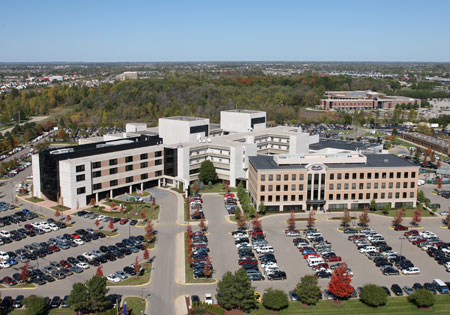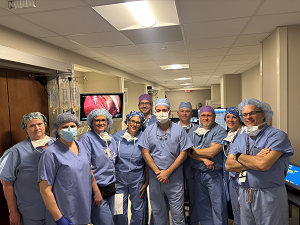Robotic Surgery for Knee Replacement

DETROIT – Six Henry Ford Health System locations now offer knee replacement surgery using robotic technology, a new surgical option for one of the most common elective procedures performed on older adults.
Zimmer Biomet’s ROSA robotic knee system is available at Henry Ford Hospital, Henry Ford Allegiance Health, Henry Ford Macomb Hospital, Henry Ford West Bloomfield Hospital, Henry Ford Wyandotte Hospital and Henry Ford Medical Center-Cottage in Grosse Pointe Farms.
Robotic technology for joint replacement surgery was originally introduced three years ago at Henry Ford West Bloomfield, which began using Stryker’s Mako robotic system for partial knee replacements and hip replacements.
“Using robotic guidance technology is a new tool to perform the surgery, and it’s been shown to improve the accuracy for positioning the knee implant,” says Robb Weir, M.D., vice chair of Henry Ford’s adult reconstruction division and chief of orthopedic surgery at Henry Ford West Bloomfield. “The technology, however, doesn’t change how we perform knee replacement surgery. In this case, the surgeon uses the technology to control and move surgical instruments.”
More than 600,000 knee replacements are performed each year in the United States, according to the Agency for Healthcare Research and Quality. By comparison, at least 300,000 hip replacements are performed annually.
Pain and disability often l ead people to surgery.
ead people to surgery.
During knee replacement surgery, the damaged cartilage and bone is removed from the knee and replaced with a prosthetic implant, whose components are made of metal, plastic or ceramic. The implant mimics the shape and movement of a natural joint.
The robotic approach uses 3D technology prior to surgery to pinpoint important markers in the knee for prepping the bone for the implant. Using a robotic surgical arm and 3D technology, the surgeon guides the implant in place while shaping and balancing the bone and ligaments to ensure a proper and precise fit.
After surgery, most Henry Ford knee replacement patients return home the same day or the next day. Generally, people between the ages of 50 and 80 undergo knee replacement. The average age for both men and women is 66.
Dr. Weir recommends patients discuss with their surgeon whether the robotic approach best meets their needs.
“The alignment you can get and the position of the parts you can get is better with robotic surgery,” he says.
Whether robotic surgery results in better outcomes, pain relief, recovery and patient satisfaction is unknown currently, absent long-term clinical studies comparing robotic surgery to the traditional approach.
“The hope is that improved accuracy means greater longevity,” Dr. Weir says.
###
MEDIA CONTACT: David Olejarz / David.Olejarz@hfhs.org / 313.874.4094
.svg?iar=0&hash=F6049510E33E4E6D8196C26CCC0A64A4)

/hfh-logo-main--white.svg?iar=0&hash=ED491CBFADFB7670FAE94559C98D7798)









